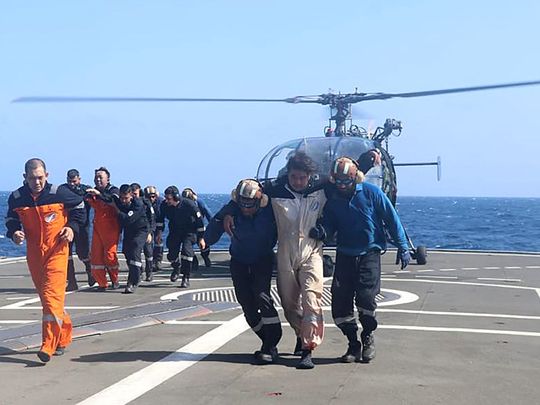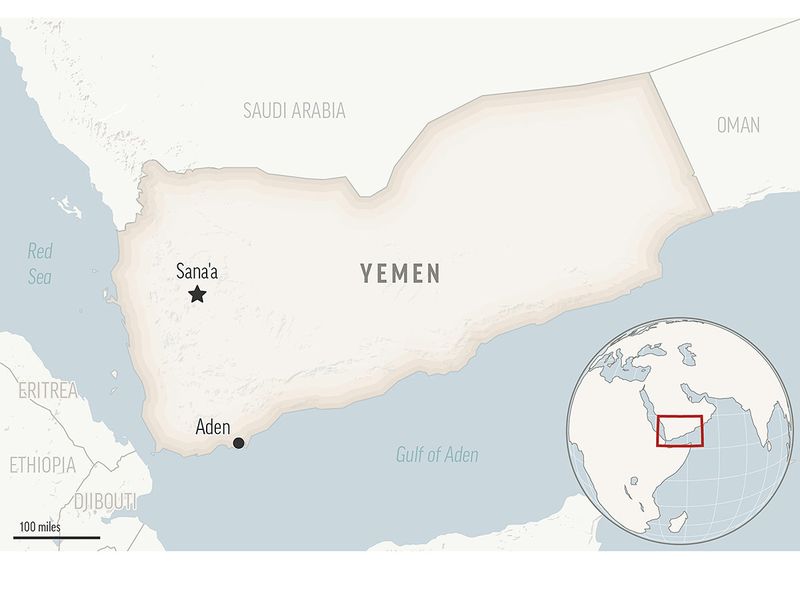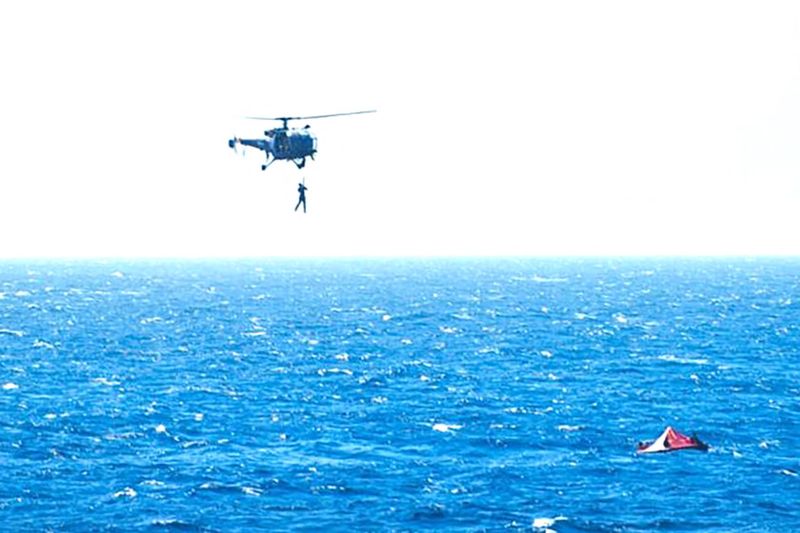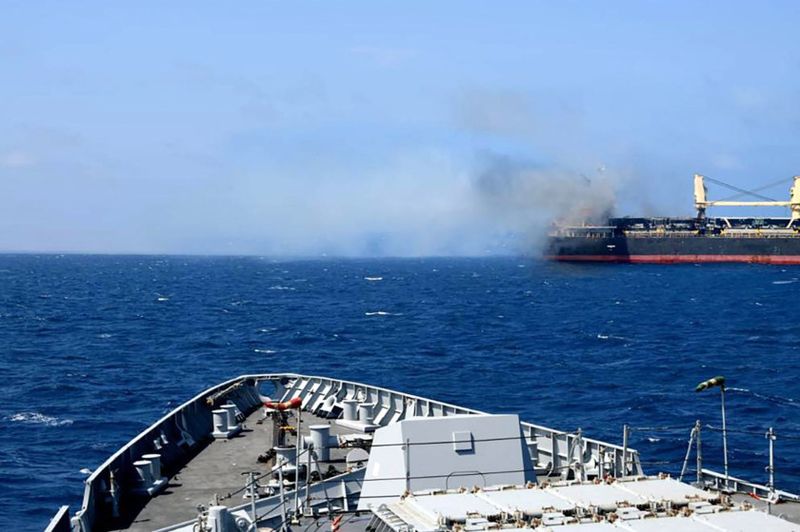
DUBAI: The first fatal attack by Yemen’s Houthi militants on shipping threatens to further sever a crucial maritime artery for global trade and carries with it risks beyond those just at sea.
Already, the White House is warning that there will be a response to Wednesday’s attack on the Barbados-flagged, Liberian-owned bulk carrier True Confidence in the Gulf of Aden.
What that will look like remains unclear, but the US already has launched round after round of airstrikes targeting the Houthis, a militant group that has held Yemen’s capital since 2014, and more are likely on the way.
However, there’s already a wider economic, humanitarian and political impact looming from the attack. It also further highlights Yemen’s yearslong war, now overshadowed by Israel’s grinding war on Hamas on the Gaza Strip that may reach into the holy Muslim fasting month of Ramadan, raising the danger of worsening regional anger.

In fact, 40% of Asia-Europe trade normally goes through the area, including a huge amount of oil and diesel fuel for import-dependent Europe. So do food products like palm oil and grain and anything else brought over on container ships, which is most of the world’s manufactured products.
In all, about 30% of global container traffic and more than 1 million barrels of crude oil per day typically head through the Suez Canal, according to global freight booking platform Freightos Group.
HOW ARE HOUTHI ATTACKS AFFECTING TRADE?
Huge shipping container companies, including Maersk, are avoiding the Red Sea and sending their ships around Africa and the Cape of Good Hope. That adds a week to two weeks to voyages and increases costs for for shipping, fuel and more.
At least 90% of the container ships that had been going through the Suez Canal are now rerouting around the tip of Africa, said Simon Heaney, senior manager of container research for Drewry, a maritime research consultancy.
The cost to ship a standard 40-foot container from China to northern Europe has jumped from $1,500 to $4,000, according to the Kiel Institute for the World Economy in Germany. But that is still far from the $14,000 seen during the pandemic.
The delays contributed to a 1.3% decline in world trade in December, reflecting goods stuck on ships rather than being offloaded in port.
WHAT DOES IT MEAN FOR OIL PRICES?
Crude prices rose about 4% following the US-led airstrikes. International benchmark Brent traded at just over $80 per barrel Friday, still down from about $84 on the eve of the October 7 Hamas attack on Israel.
“While this puts upwards pressure on global oil prices, it is unlikely to represent a serious energy supply shock for now,” Simone Tagliapietra, an energy analyst at the Bruegel think tank in Brussels, tweeted.
That could change if the Hamas-Israel and Al Houthi conflicts escalate and lead to trouble at the Strait of Hormuz at the southern end of the Arabian Gulf, he said.
“That would have massive implications for global energy markets,” Tagliapietra said.
HOW IS THE WORLD RESPONDING?
The US is leading a security initiative to protect ships in the Red Sea that includes United Kingdom, Bahrain, Canada, France, Italy, Netherlands, Norway, Seychelles and Spain. Al Houthis have no navy to impose a cordon, relying on harassing fire and only one helicopter-borne assault so far.
Friday’s strikes killed at least five Al Houthi troops and wounded six, the rebels said, without elaborating on what was targeted. It was unclear how extensive the damage from the US strikes were, though the Houthis said at least five sites, including airfields, had been attacked. -- Reuters
HIGH-SEAS CRISIS WIDENS
Since the onset of the Houthi attacks, the militants have framed them as a way to pressure Israel to stop the war, which has killed over 30,700 Palestinians, according to Gaza’s Health Ministry.
The war began October 7 with a Hamas attack in Israel that killed about 1,200 people and took 250 others hostage.
But as shippers began avoiding the Gulf of Aden and the Red Sea, the militants began attacking ships with tenuous — or no — ties to Israel or the war. Meanwhile, US and coalition warships have shot down any Houthi fire that’s come near them. That’s left the rebels targeting commercial ships whose only protection has been armed guards, barbed-wire fencing and water cannons — good enough to deter pirates, but not an anti-ship ballistic missile.

Wednesday’s attack underlines the danger to those not even involved in the war. The Houthi missile that hit the True Confidence killed two Filipinos and one Vietnamese national. The Iranian-backed Houthis have not acknowledged those deaths and sought to distance themselves from any consequence of their actions.
“We hold America responsible for the repercussions of everything that happens,” Houthi spokesman Mohammed Abdulsalam wrote online Thursday.
Another ship sank this past weekend after being abandoned following a Houthi attack.
AID, ECONOMIES BECOME CASUALTIES
Already, the Houthis have attacked at least one ship carrying aid bound for territory they hold. The Greek-flagged, US-owned bulk carrier Sea Champion had been full of grain from Argentina and was bound for Aden and then rebel-held Hodeida when it was hit in February. As hunger stalks the Gaza Strip during the Israel war, so too does it still grip Yemen, the Arab world’s poorest country.
“The escalation of the crisis in the Red Sea is likely to worsen the food insecurity situation in Yemen in 2024, exacerbating an already dire humanitarian crisis,” the UN Food and Agriculture Organization has warned.

Then there are the conflicts gripping East Africa. The World Food Program issued a warning Tuesday regarding its operations in Somalia, saying the shipping crisis is hindering its ability to “maintain its regular flow of humanitarian aid.”
In war-torn Sudan, the International Rescue Committee says it has suspended its operations to Port Sudan over hiked costs and other concerns rising from the Houthi attacks.
Then there’s the economic pressure. While Israel has described its economy as so far unaffected, the same can’t be said for neighboring Egypt. Traffic in its Suez Canal linking the Red Sea to the Mediterranean Sea onward to Europe has dropped by nearly half, according to UN figures.
Those shipping fees provide crucial revenue for Egypt’s government, which has allowed the Egyptian pound to rapidly devalue as it reached a deal with the International Monetary Fund to increase its bailout loan from $3 billion to $8 billion. Further economic turmoil could spark unrest in Egypt, less than 15 years on from the 2011 Arab Spring.
AIRSTRIKES MAY IMPERIL PEACE TALKS, EMPOWER HOUTHIS
Since beginning its campaign of airstrikes in January, the US military has claimed it destroyed over 100 Houthi missiles, according to an Associated Press analysis of its statements. However, that hasn’t halted the militants’ ability to launch attacks.
That’s something a Saudi-led coalition fighting the Houthis learned after launching its own campaign against the militants beginning in 2015 in support of the country’s exiled government. The American strikes so far have been more precise, with only one reported civilian death so far over dozens of attacks.
For the Houthis, the fight against Israel and the US may be everything they’ve wanted. Their Zaydi Shiite group ran a 1,000-year kingdom in Yemen until 1962. Their slogan has long been: “God is the greatest; death to America; death to Israel; curse the Jews; victory to Islam.”
Fighting against two of their archenemies allows the militants to shore up their own support with Yemen, as well as gain international recognition in an Arab world otherwise enraged by the killing of Palestinians in Israel’s campaign in the Gaza Strip. If fighting there goes into Ramadan, a time in Islam for peace and reflection, it may inspire a further spread of militant violence.












